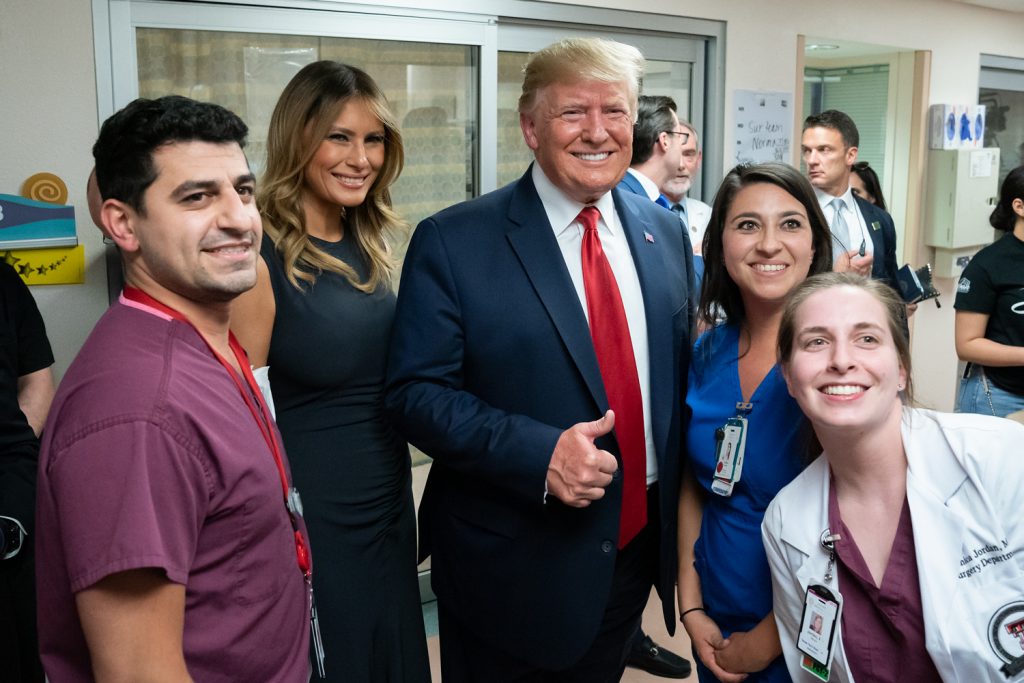A Guide to the President’s Proposed (and Politicized) Health Care Plans

Recently, President Trump took to the stage in Florida to talk about health care. His speech outlined various policy proposals and reforms he wants to implement – or, at least, that was the idea.
Often resembling a campaign rally, Trump focused little on specifics. Instead, he alternated between boasting about his administration’s health care achievements and attacking Democratic proposals as socialism which would rob seniors of health care.
The message went over well with the crowd at The Villages, a large retirement community in deep-red Orlando. They cheered, chanted “four more years,” and even gave the President a standing ovation.
As with any Trump speech, there was a lot of information to unpack. However, unlike a typical campaign rally, Trump’s speech was devoted (for the most part) to health care — an issue affecting practically every American.
Here’s a closer look at the details, feasibility and accuracy of the Trump Administration’s current health care proposals.
Outline of Trump’s Speech and Executive Order
In broad strokes, Trump’s proposed health care plan has four key points:
- Protect vulnerable patients
- Reduce prescription drug care costs
- Increase choices and control over health care plans
- Improve veteran care
In addition to his speech, Trump also signed an executive order related to health care. Titled “Protecting and Improving Medicare for Our Nation’s Seniors,” it outlined several actions and proposals with varying specificity.
The crux of the order boosts and protects Medicare Advantage, a private insurance augmentation to traditional Medicare. Medicare Advantage grows in popularity each year and remains consistently popular among enrollees.
Trump’s executive order directs the Department of Health and Human Services to expand plan options for seniors, increase plan options, increase payment options and streamline the enrollment process. Generally, the order aims to eliminate waste, fraud and inefficiency.
A Positive for Public Health or a Political Ploy?
While that all sounds relatively benign, the specific language in the bill removes requirements for “essential health benefits” under Obamacare. Instead, the Medicare Advantage plans are governed by state rules, which can be significantly laxer than ACA regulations (although not always). Far from eliminating the ACA, the executive order is a relatively veiled move in that general direction.
Critics say the order attacks Medicare-for-All proposals, and is primarily a political ploy. Health care is a major issue for voters. As the Democratic presidential nominee field narrows and election day draws closer, health care will continue to be in the news and in the minds of voters.
Sanders and Warren support Medicare-for-All, a massive expansion of the system which would cover all citizens and lawful residents. The other Democratic nominees support a public option, which is the idea of a government-created and run insurance agency which exists alongside private insurers.
Socialist Destruction!
As illustrated by the executive order, Republicans are moving in the entirely opposite direction. Instead of expanding public options, they want to expand private insurance. Additionally, they appear poised to demonize Democratic plans at every opportunity.
“These Democratic policy proposals … may go by different by different names, whether it’s single-payer or the so-called public option, but they’re all based on the totally same terrible idea: They want to raid Medicare to fund a thing called socialism.”
While his rhetoric is borderline nonsensical, and unlikely to appeal to anyone beyond hardcore Trump fans, the overall focus on Medicare, and fears of losing it, is likely politically shrewd.
Medicare’s popularity crosses political lines. Eight in 10 people, regardless of political affiliation, think Medicare is a good idea. Most people currently on Medicare don’t want to lose it, and people not on it have favorable feelings towards it.

A Closer Look at Trump’s Health Care Claims
Although Trump’s health care speech was supposed to focus on policy, it veered wildly off-course several times. He made quite a few claims which need additional scrutiny.
Illegal Immigrant Health Care Coverage
“Leading Democrats have pledged to give free health care to illegal immigrants,” Trump said in the speech. “I will never allow these politicians to steal your health care and give it away to illegal aliens.”
That’s mostly false. The President was likely referring to a recent Democratic primary debate where many candidates said their health care plans would cover undocumented immigrants. However, the hypothetical health care discussed was never free. Many candidates specifically said coverage would require copays, deductibles, and other costs.
Protection for Pre-existing Conditions
Protecting coverage for people with pre-existing conditions is a major stated component of Trump’s health care plans. While it’s possible for the future, both PolitiFact and Kaiser Health News rated these general statements false based on the Administration’s past actions.
Reduction in Household Income
During his speech, Trump said Medicare-for-All would “reduce American’s household income by $17,000 a year.”
Of all the questionable statements during the speech, this one is perhaps the most downright bizarre. The White House provided no data or additional explanation, and no news organization has been able to figure out where that number came from.
The idea of Medicare-for-All is still in development. In general terms, some households might pay more in health care and others less. But an across-the-board reduction in household income, and for such a specific amount, is an entirely false idea.
Eliminating Doctors and Hospitals
During his speech, Trump said, “The Democrats’ plan for socialized medicine will not just put doctors and hospitals out of business, they will also deny your treatment and everything that you need.”
It’s a common talking point against both single-payer and Medicare-for-All. While it’s a complicated issue, overall the statement is false.
Like household income, it’s too early to say exactly what would happen to each individual hospital in the country. However, it’s likely some would see a boost in income, while others would lose money. Basically, hospitals that currently treat a lot of uninsured people would see an economic improvement. Hospitals that mainly see people with private insurance would likely lose at least some revenue. Keep in mind this talking point is heavily promoted, and likely even created, by the hospital industry.
The Future of Health Care Under President Trump
Health care policy is complicated and nuanced. There are significant differences between the two parties regarding which approach is best. Unfortunately, Trump’s recent speech not only failed to clarify the issue but confused it even further. He strongly signaled his intention to use health care, and Medicare specifically, as a political tool, without much regard for accuracy or even coherency. While it’s a strategy which might win an election, the actual policy effects remain unknown.



Leave a Comment